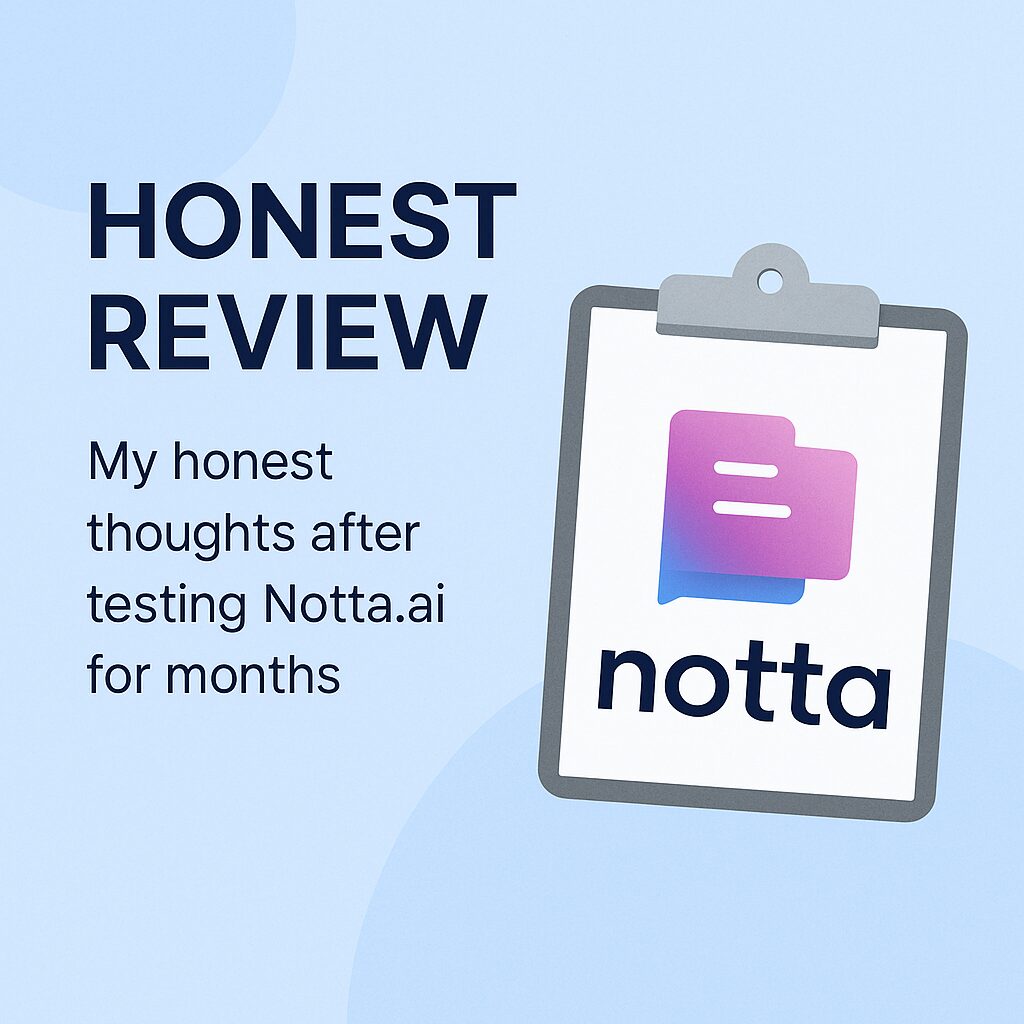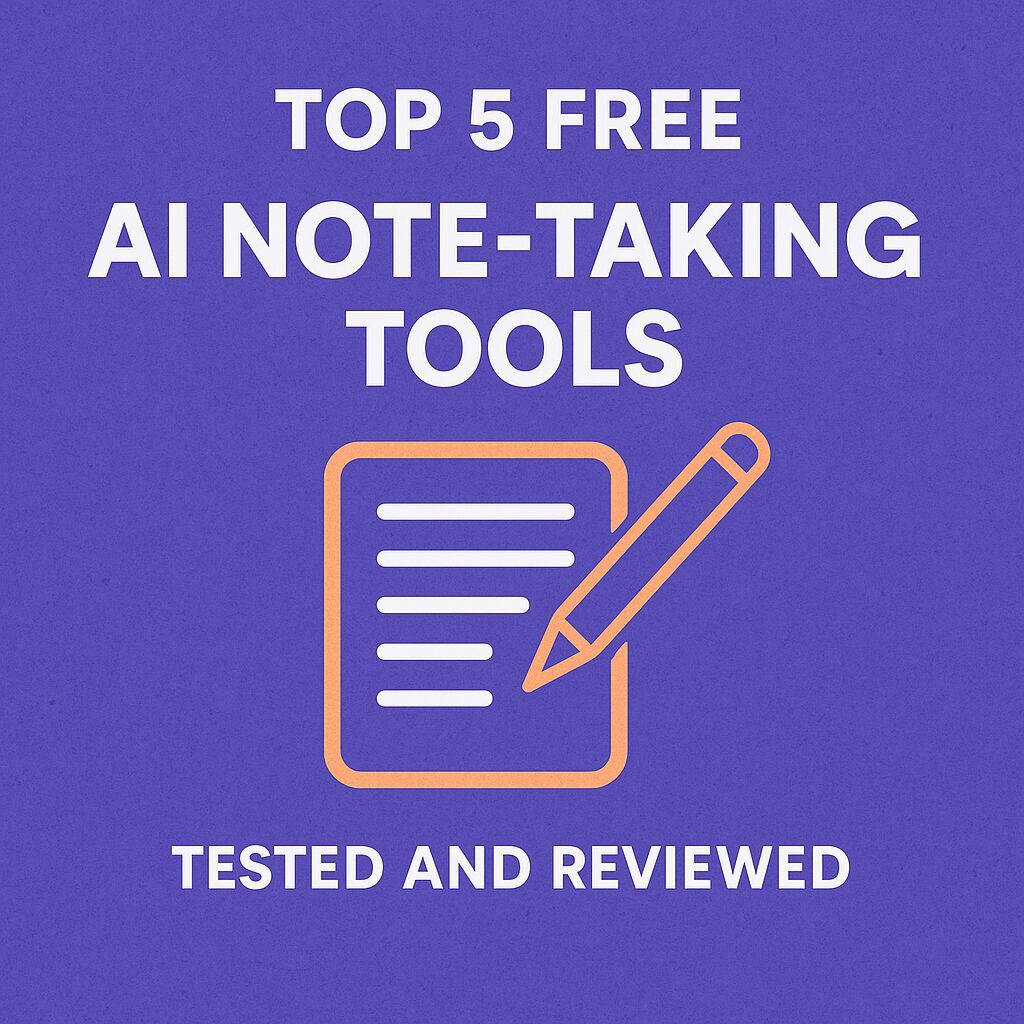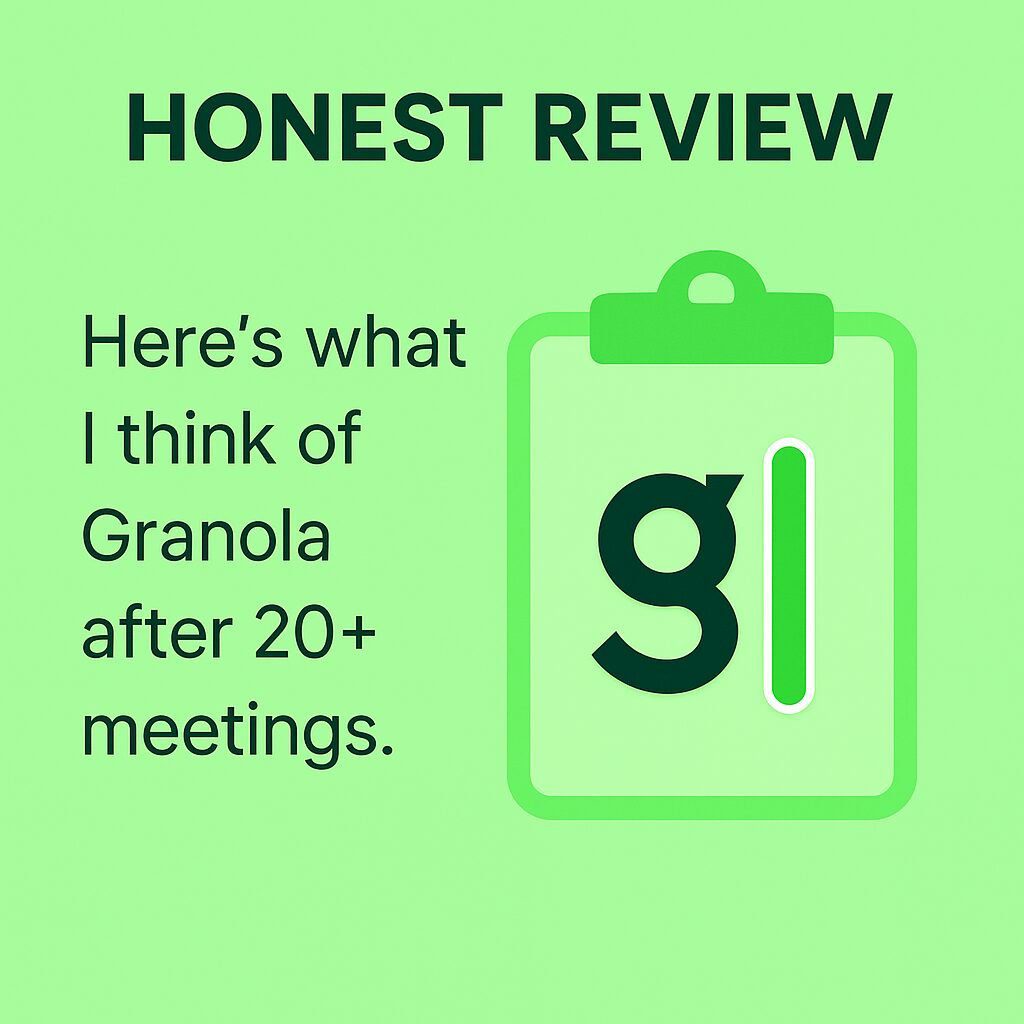Sales engagement platforms are sophisticated tools designed to simplify your life as a salesperson. They streamline and optimize the sales processes, making them must-have tools for any sales team.
They’re currently storming the scene, with a market size valued at 8.95 Billion USD in 2024, projected to reach a mammoth 24.99 Billion by the end of 2031. Sales engagement tools are thought to be the fastest growing tech in their sector. But let’s start with the basics…
What Are Sales Engagement Platforms?
Sales engagement platforms provide a centralized hub to efficiently manage your outreach efforts. From a single interface, you can plan, execute, analyze, measure and optimize interactions between sales and customers across various different channels.
Put simply, this means you can interact with potential customers with more thought and purpose. You can compare it to a CRM system, only where your CRM stores customer information and interactions, your sales enablement platforms are designed to specifically automate interactions with buyers. They’re similar, but sales engagement platforms are built for sales teams.
You can use these platforms to equip your business with robust analytics tools, customizable workflows, and seamless integrations. The main reason why you’d use a sales engagement tool is to accelerate revenue growth and build stronger customer relationships.
Main Features Of Sales Engagement Tools
- Multi-channel reach. Reach out through various channels easily (email, phone, social media).
- Automate and save. Save time with automated tasks (follow-up emails, schedules, etc.).
- Personalized connections. Customize messages for better connections (create templates and tailor messages to the appropriate audience).
- Insightful analytics. Monitor sales performances with built-in analytics.
- Instant data. Seamlessly integrate with your CRM system.
- Flexible workflows. Tailor workflows to fit your needs.
- Consistent communication. Maintain a consistent outreach strategy.
10 Benefits Of Sales Engagement Tools
Integrating sales enablement tools into your strategy offers numerous benefits that directly enhance your sales effectiveness. From streamlined communication to personal outreach, here are ten reasons why sales engagement tools will benefit your business.
1. Boosted Communication
Sales engagement platforms make it easy to communicate with your prospects in multiple ways. You can streamline communication with customers through voice calls, emails, social media, live chat, and more all through one single platform.
Most sales engagement platforms offer personalized email outreach and multitouch campaign capabilities too, allowing you to not only communicate faster, but better. They highlight where your communications falter so you can avoid missing more opportunities.
“Communication is your ticket to success if you pay attention and learn to do it effectively.”
Theo Gold, Author of Positive Thinking Tweet
2. State-of-the-Art Automation
Sales automation features allow you to complete your daily mundane tasks without lifting a finger. They eliminate the downtime between interactions, freeing up your day to focus on actually selling.
When you automate tasks through a sales engagement platform, it becomes easier to close negotiations as you have more time and energy to spend in the sales call. 94% of workers say they perform repetitive, time-consuming tasks at work! Sales enablement tools are designed to reduce that amount. Just look at some other powerful stats below.
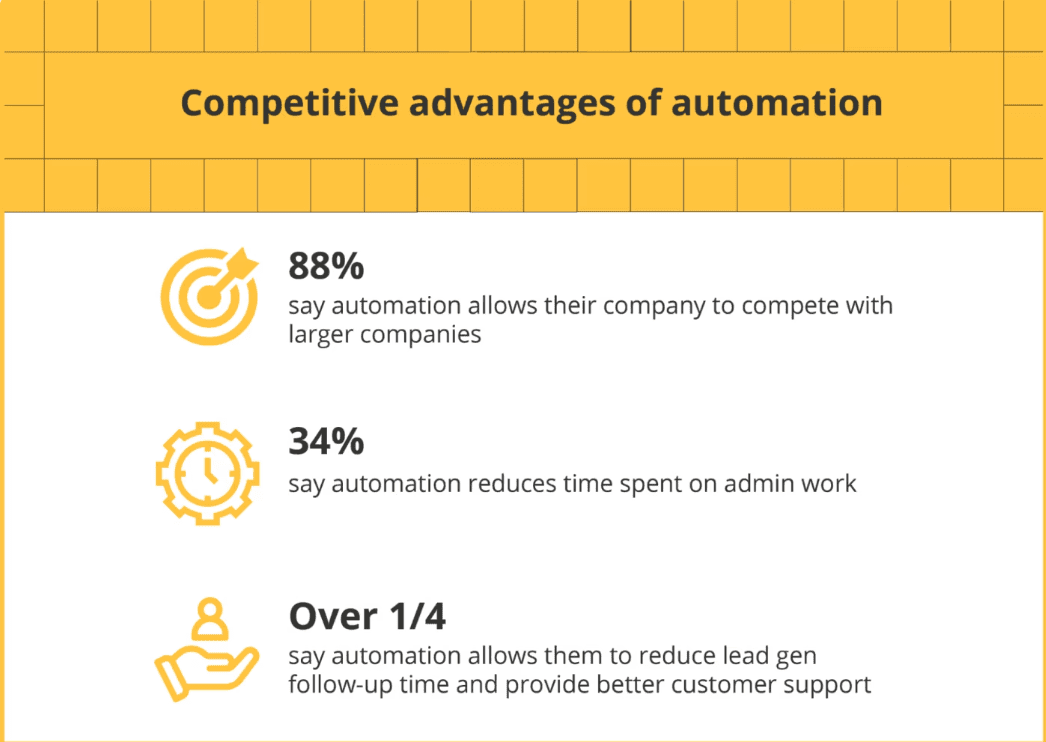
3. Increased Productivity
When you use a sales interaction platform it will boost the productivity of your team’s outreach. By saving time with the automation step above, you can be more productive where it actually counts.
Taking things a step further, most sales engagement tools help you sell smarter. They often have AI measuring capabilities that will compare whether an email or a phone call (or other form of communication) is best suited, depending on the stage of the sale. This not only saves you time, it optimizes your efforts.
These systems measure the success of each of your prospect’s touchpoints, helping you develop the relationship and troubleshoot any problems that may occur.
4. Better Organization
With everything being centralized, your sales team can work faster as all your data is in one easy-to-reach place. This saves you countless hours of sourcing data, switching tabs for different applications, or searching for hours through spreadsheets.
These tools iron out your organization, leading to improved customer engagement and reducing the risk of leads being missed. Being organized is such an important factor in the realm of sales, as when you’re on top of everything you’ll have a much better high-level view. You’ll be able to strategize for the long-term and track your progress to ensure that targets are hit consistently.
“With organization comes empowerment.”
Lynda Peterson, Professional Organizer Tweet
5. Generate More Leads
Sales engagement platforms provide timely lead-generation content. Materials such as emails, videos, and presentations are sent directly to enticing prospects automatically.
More than that though, most of these platforms offer lead scoring which empowers you to prioritize your leads based on order of likelihood to convert. This is done by collecting all your prospect data and having your sales enablement platform analyze and categorize it. They tend to have their own point-scoring system which allows you to easily identify the best leads. Just sync up your other work tools for maximum effect.
The key reason this helps is because 71.4% of salespeople said that less than half of their prospects turned out to be a good fit. Had they implemented a better lead generation strategy, they wouldn’t be in that boat…
6. Beat Your Competitors
Delaying your outreach to leads risks losing them before you’ve even made initial contact. Sales engagement platforms provide you with tailored templates to save you time when reaching out to prospects. The quicker you can reach them, the better. Marketers who follow up with web leads within 5 minutes are 9 times more likely to convert them.
When you use your sales enablement platform effectively, you can be on the phone before those 5 minutes are up. The key is to get in before your rivals can beat you to the punch.
Of course, prospects respect companies that offer great value propositions too. In fact, 96% of buyers want the seller to focus on the value they’ll receive by using the product. Go out there and give them what they want!
7. Personalized Prospecting
Using personalization tools such as dynamic customization within sales engagement platforms enables you to gauge a deeper understanding of your customer’s preferences.
For instance, after you’ve targeted customers with a marketing campaign, you can automate the follow-ups, ensuring you’re continuously communicating with customers and providing each prospect with a tailored experience.
As for initial sales calls, your sales engagement platform will help you understand who your prospect is in more depth. It was found that 76% of top performers “always” do research before reaching out to a prospect, compared to just 47% of other sellers. Make sure your sales team is in the top percentile. Never go in without research.
“It's about caring enough to create value for customers. If you get that part right, selling is easy.”
Anthony Iannarino, Author Tweet
8. CRM Integration
Through a CRM integration, you can enhance sales engagement tools in multiple ways. Firstly it provides lead management which tracks your leads by centralizing and organizing prospect data, eliminating manual tracking, and saving you a lot of time in the process.
Secondly, in just a few clicks you can streamline financial reports without getting lost in the numbers. This reduces the amount of time that your accountants need to track your books. It also helps boost your profits by helping your business track every potential lead, identify any gaps in the sales process, and strategize appropriately for the best engagement with your customers.
Plus, an integration with your favorite CRM system will help you collect contact information, purchase history, and interaction history, among other things. When synced up, your sales engagement tool will be able to analyze it to help you craft better strategies. You’ll be able to easily prioritize tasks based on the CRM’s data and instantly access a wealth of prospect information that can help you clinch the sale!
9. Access To Multiple Tools
Sales engagement platforms provide an array of tools and integrations, including content management systems, email platforms, voice calls, SMS/texting, and other tools to aid marketing, outreach, and your team’s overall sales efforts.
Having all of these tools in one place enables your team to establish meaningful connections with potential prospects. Once again, this frees up their time to concentrate on more important matters like closing deals.
10. Management and Sales Training
Managers and team leaders gain a comprehensive view of all forms of engagement data, such as website and social media interactions, as well as other important metrics. This allows you to monitor sales performance and pinpoint areas to improve.
If you want to take this to the next level, you can set up a structured sales training plan based on the engagement data. This will help your team fill in the gaps when they’re not reaching their full potential.
What Are The Best Sales Engagement Tools?
There are some key factors to consider when deciding which sales tool is right for you! Here we have five of the best currently on the market.
But before that, check out this great infographic that provides three key factors to consider when making that decision:
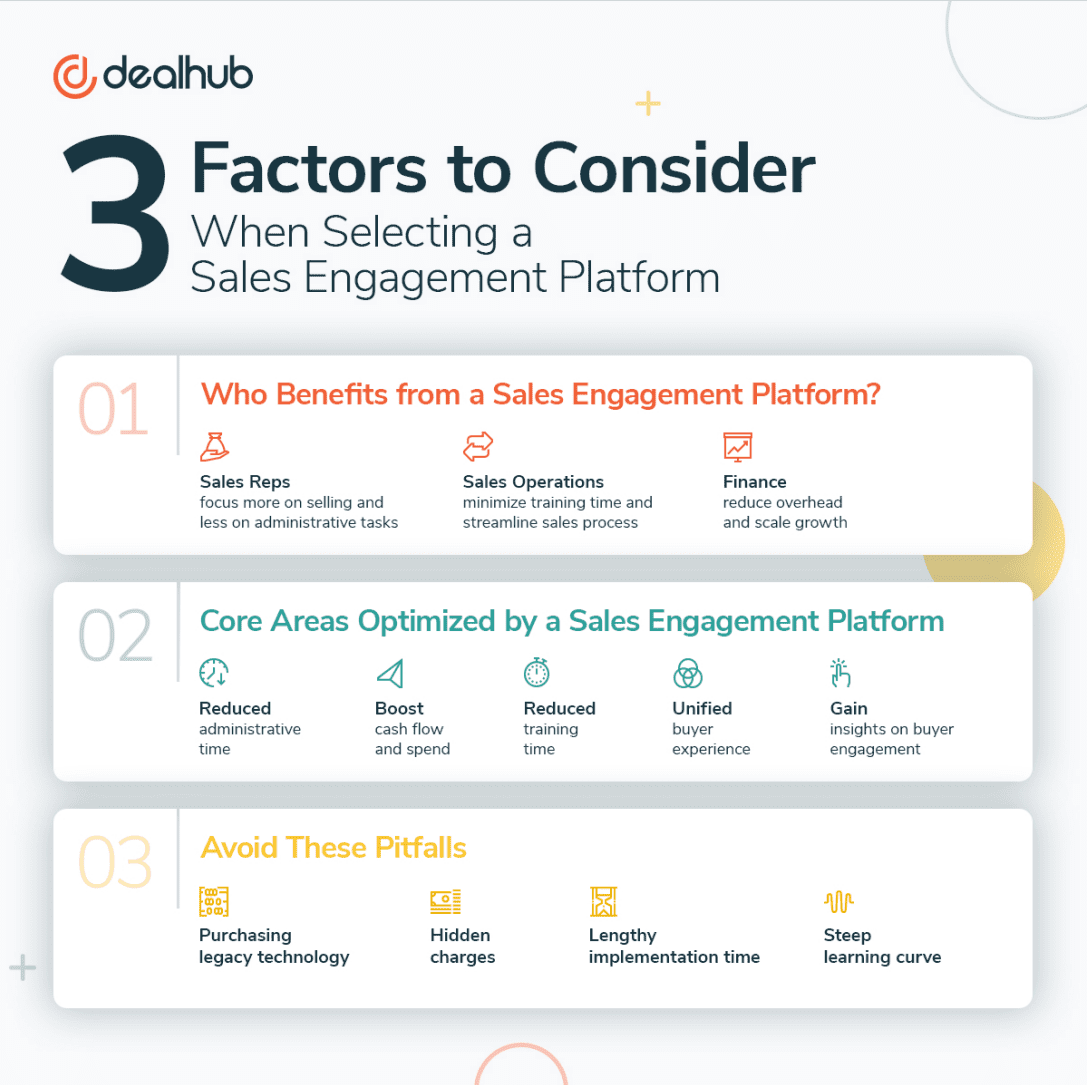
1. Hubspot (Sales Hub)
Hubspot Sales Hub comprises a collection of features and tools aimed at simplifying workflows, facilitating data-driven decisions, strengthening customer relationships, and achieving sales excellence. Sales Hub’s motto is all about empowering you to “index quality over quantity.”
Sales Hub helps you foster deeper customer connections with its seamless integration with Hubspot’s CRM. It presents a unified solution for managing leads, contacts, and deals.
You can utilize Sales Hub in numerous ways. By using its robust CRM integration, you can centralize lead management, ensuring all your customer interactions are tracked and analyzed. This helps you build a deeper understanding of your prospects’ needs, wants, and aspirations, providing a more tailored and personalized outreach.
Hubspot’s automation capabilities help streamline emails and follow-ups, allowing you to focus on building relationships and closing deals.
Key Features
- Lead management and prospecting
- Email templates & tracking
- Sales automation
- Forecasting
- Customer database
- Referral monitoring
- Sales analytics & reporting
- Quote software
- Playbooks
- Meeting scheduler
Drawbacks
However, some users should be wary of cost as the various subscriptions needed can rack up in price. It varies from $95-165+ per seat per month, which can be a little steep for small businesses.
Also, potential learning curves are common if your team is not familiar with Hubspot already. Be prepared for additional training.
2. Groove
Groove is a sales engagement platform designed to streamline your sales processes and enhance your customer interactions. What sets Groove apart is its focus on providing you with a user-friendly interface that simplifies sales tasks.
Not only that but Groove integrates natively with Salesforce’s CRM software. Since Clari has acquired Groove, it’s become the self-proclaimed “first complete revenue platform. [It brings] your entire revenue process into one unified platform so that you can consolidate, simplify, and accelerate.”
You can use Groove to improve your team’s sales strategies in multiple ways. The platform’s integration with CRMs allows for everything lead-related to all be in one place, making it easier to track and analyze your interactions. Through a point-based system, lead scoring can be leveraged to assign values to each prospect and put them in order of priority.
Groove’s automation features known as “triggers” can help you set up actions with automated replies. For example, whenever a prospect replies to an email, you can set a trigger so that your reply will be automatic. This is just one of the many ways Groove helps you reduce manual effort and allows your team to focus on building rapport and sealing the deal instead.
Groove also provides insights into your team’s performance through sales analytics, helping you identify areas for improvement and build sales training programs around them.
Key Features
- User interface
- Service and support
- Task management
- Email tracking and automation
- CRM integration
- Workflow management
- Open rates
- AI-powered insights
Drawbacks
Groove has a ton of robust sales engagement features, but it isn’t as customizable as other platforms. It lacks the flexibility to be number one. Groove’s pricing structure is also relatively high and may be difficult if you’re on a budget. There’s no direct pricing listed on the website and you have to reach out to the team if you want a demo.
3. Salesloft
Salesloft is the “first AI-powered revenue orchestration platform.” It empowers your team to engage with customers smartly.
Salesloft focuses on providing you with a complete overall solution for sales outreach, including email, phone calls, social selling, and more. With additional features, including sales dialers, LinkedIn Sales Navigator integration, and a cold email tool, it stands out from many of its competitors due to its sheer comprehensiveness.
If you’re looking for a sales engagement platform that lets you create personalized sequences of communications automatically, Salesloft is worth a second look. It’s a great tool for ensuring your comms are consistent and timely with all of your customers.
Each interaction can be logged automatically and synced directly into your CRM. This ensures prospect information is always at hand when you need it. Furthermore, AI-driven sales intelligence monitors your team’s sales calls and provides feedback on their performance, helping you improve and close more deals in the future.
Key Features
- Meeting management
- Interaction tracking
- Customer database
- Lead distribution
- Prospecting tools
- Call repository
- CRM synchronization
- Real-time coaching
Drawbacks
Although a fantastic sales engagement tool, one of its drawbacks is its complexity. It’s advisable to assess whether you require all its features as it’s tailored to larger businesses and requires a complete shift of your workflow onto Salesloft.
4. Salesforce (Sales Engagement)
Salesforce has a dedicated sales engagement platform with all the tools and features to enhance your team’s customer engagement and drive sales success. Their motto is, “Sell faster with Sales Engagement directly into your CRM.”
This tool allows you to track leads through an easy-to-use interface and offers various features, including reporting for detailed analytics, forecasting, and lead management. If you’re already using Salesforce as your CRM, this might as well be your go-to choice. It’s an all-in-one comprehensive sales tool that maximizes your sales team’s potential.
One cool thing Salesforce does is it automatically retrieves data to customize your quotes and invoices. You can even monitor the products associated with your customer’s deals and set up replenishment schedules. Additionally, Salesforce is remote-friendly, offering mobile accessibility for you to operate from any location.
Key Features
- Mobile application
- Buyer assistant
- Lightning sales console
- Automated actions
- Sales cadences
- Einstein insights
- Sales dialer
Drawbacks
Due to its complexity, Salesforce does come with a steep learning curve. To appreciate the software in its full beauty, training is required which can affect your time and budget.
5. Freshworks (Freshsales)
Freshworks is a powerful CRM software designed to streamline your sales processes and improve your customer relationships. Freshsales, on the other hand, is a sister sales enablement platform that stands out for its affordable price tag on top of its user-friendly software, not to mention the abundance of features it offers.
Overall, this is more of a CRM than a sales engagement tool, however because of its laser sharp focus on sales, we’ve included it here. If anything, the fact it also operates as a CRM is a benefit as it doesn’t require any third-party integrations to streamline all your data into one location.
You can manage leads, track deals and engage with customers all under one roof with Freshworks. Make use of its powerful lead scoring feature too, which empowers you to direct resources at prospects that are more likely to convert.
You can leverage Freshsales’ lead management features to enable your sales reps to capture, qualify, and nurture leads more efficiently. You can also make use of its popular email tracking feature which provides insights into your prospects’ engagement levels. With this, you can improve your replies and optimize your follow-up speed.
Key Features
- Lead management
- Lead scoring
- Contact management
- Deal management
- Email automation and tracking
- Reporting and analytics
- Workflow automation
- Integration
- Mobile app
- Native CRM integration
Drawbacks
The downside to Freshworks is that although it’s impressive, it’s limited in comparison to other sales engagement platforms. Its customization level is not up to scratch with the big dogs and the app isn’t as flexible as most sales reps would like it to be.
Maximize Your Potential with Sales Engagement Platforms
Sales enablement platforms are crucial for modern sales success. They help improve sales strategies, boost revenue, and make the sales process smoother by putting all the necessary resources, insights, and training material in one place for everyone to use. They give you the power to sell more efficiently.
Be wise and join the ever-growing number of sales enablement tool users.


